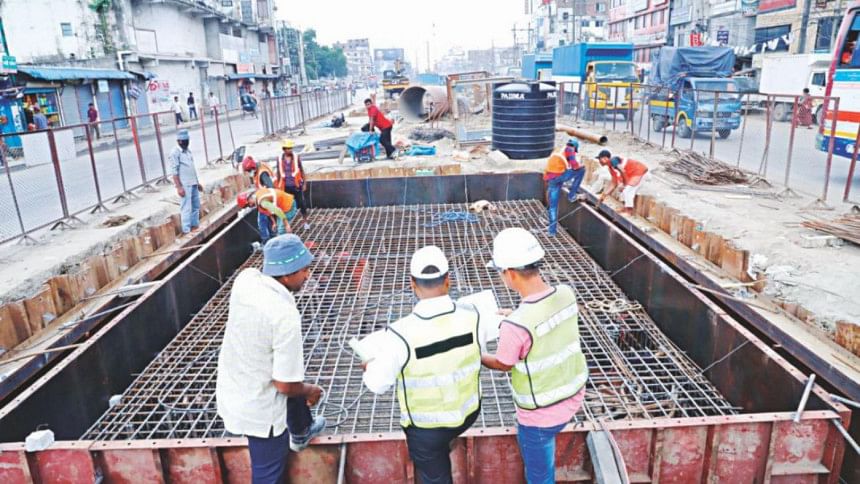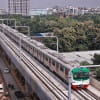BRT: An excellent idea gone haywire

One of the major communications projects, the Bus Rapid Transport (BRT), an excellent idea that was supposed to facilitate the movement of large numbers of people with ease in and around the capital city has been in limbo for the last six years. Project delays have resulted in pushing back the timeline (by a further six years to around 2024) for completion and now we have another menace on our hands and that is the unplanned construction of flyovers which threaten to scuttle the project altogether.
Urban planners consider the BRT to be a milestone in the country's communication infrastructure and not without reason. As per a report in this paper printed on August 26, this is a multi-agency road construction project that involves the Roads and Highways Department (RHD), Bangladesh Bridge Authority (BBA) and the Local Government Engineering Department (LGED); the project includes setting up 25 BRT stations, a depot in Gazipur, two terminals (one in Gazipur and another at the Hazrat Shahjalal International airport) and six overpasses. We are looking at a grand project that would lead to some 56 km of link road, development of more than 20 km of footpath, 24 km of storm drainage and 10 kitchen markets.
Although the original project cost was estimated at Tk 2,040 crore, the cost has more than doubled to Tk 4,264 crore because six years after its inception, only 20 percent work has been completed. Chronic delays in implementation have now become a staple in our building efforts unfortunately. Indeed, we now have the distinction of having implementation periods that are five times longer than the global standard, and that explains not only the cost overruns but the havoc with the strategic transport plan. While it is useless to compare our rollout of a project like this with that of cities in advanced countries, it does not excuse policymakers for such inordinate delays. Going by the rate of progress, the BRT network will probably be a decade in the making (since it started in 2012) which is not only unacceptable by any standards but also defeats the purpose of building the project given the rate at which the population is increasing and the pace at which the economy is moving forward.
Now, we have another problem. The building of unplanned flyovers in the city, one of which is threatening to cut the BRT's proposed route by half. What is the point of building a flyover that threatens to curtail the BRT network, other than lining up the pockets of contractors and their associates? When we consider the fact that the BRT occupies dedicated and separate lanes on our roads and which will be free of the terrific gridlocks Dhaka city is infamous for, would someone at policy level care to tell us why we continue to construct flyovers that are not planned for in the city's transport master plan?
According to media reports, it now takes around three hours to travel from Hazrat Shahjalal International Airport to Keraniganj. If we had a working BRT system, the travel time would be one hour. We were promised a BRT line between the airport and Keraniganj in 2013 and another line between Gazipur and the airport by 2014. It is now 2018 and there is no BRT and the rate at which we are building, there will be no BRT before 2024. It is not just a question of facilitating fast and safe transportation for the masses. The positive spill over effects of building a BRT network is obvious as it will generate commerce along its various routes with the setting up of kitchen markets. According to the World Bank report "Towards Greater Dhaka: A New Urban Development Paradigm Eastward", "Dhaka is exceedingly important for Bangladesh. This historic, vibrant, and endearing city is home to one-tenth of the country's population. It generates at least one-fifth of its total economic output and provides more than 40 percent of its formal sector jobs." The report further states, "Dhaka is also one of the most congested cities in the world. The average driving speed has dropped from 21 kilometres an hour 10 years ago to less than 7 kilometres an hour today. Continuing current trends would result in a further slowdown to 4 kilometres an hour, or slower than walking speed. Congestion wastes about 3.2 million working hours each day and costs the economy billions of dollars every year." With that setting in mind, Dhaka needs systems like the BRT to make the city more accessible to mass movement of people who make the wheels of the economy go round.
As we take stock of our situation, the BRT project's progress (or lack thereof) speaks volumes of how we have failed to make progress on our many mega-projects. Again, going by what has been printed in this paper, it took four years to hire a consultant and prepare the detailed design. Four years from project inception to get to the design stage. Needless to say the actual work was hampered by the forces of nature like the monsoon, against which nothing could be done. Yet things could have been done differently in other areas and that is the numerous revisions in the original draft design. For instance, the number of articulated buses that would ply the route increased from the original 50 to 120.
Every change requires revision of design, entails cost escalation and a delay in project implementation. It appears that inexperience, lengthy bidding process, poor planning are some of the key elements that seem to have become synonymous with our infrastructure building efforts. And when we add greed to that mixture, i.e. the construction of unplanned flyovers in the city that impedes the planned route for the BRT, what else can we expect but disaster? It is futile to hope that we will ever be able to stick to any timeline to complete infrastructure projects of national importance because we can't get our act together when it comes to project management.
Syed Mansur Hashim is Assistant Editor, The Daily Star.






Comments